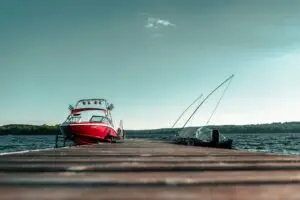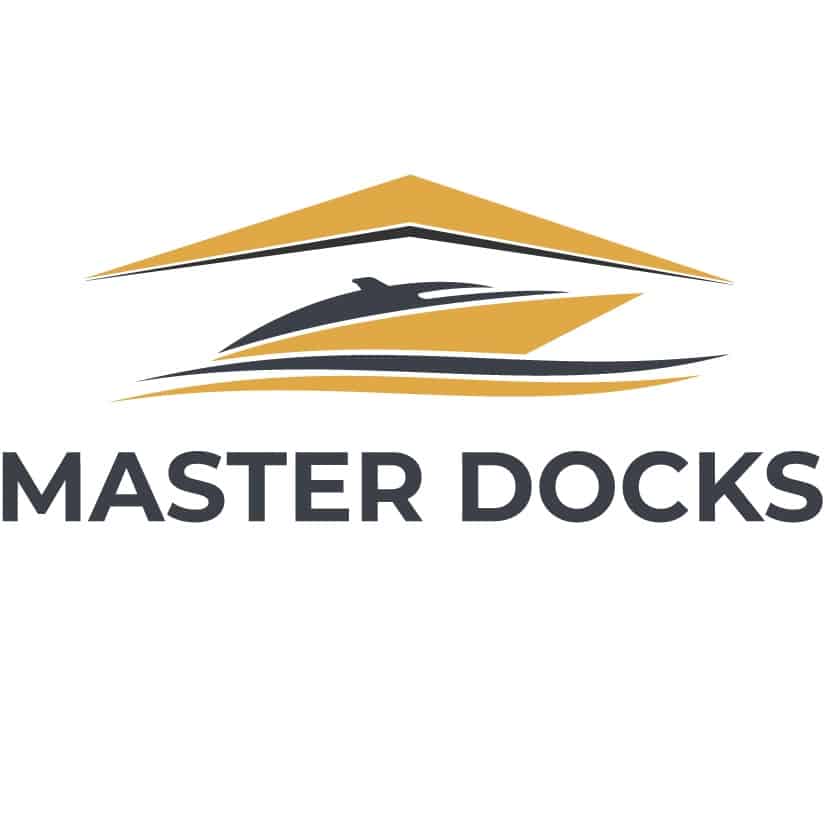Floating boat docks, the convenience and durability they offer to the all-important aspect of aesthetics, we’re unpacking it all.

It’s no secret that floating boat docks are essential for waterfront property owners, marinas, and boating enthusiasts in South Carolina and beyond. Between their convenience, versatility, and durability, these innovative docking solutions have revolutionized how we engage with the boating lifestyle.
But what exactly are floating boat docks, and how do they work? More importantly, how do you decide which type of floating dock is right for you?
How Floating Boat Docks Work
The principle behind floating docks is pretty straightforward. Typically, these docks are anchored securely to the seabed or lakebed with poles or a cable system, allowing the dock to rise and fall with the water while staying in place. The buoyancy required to keep the dock afloat is usually provided through flotation units made from foam-filled plastic or metal materials. This adaptability makes floating docks ideal for bodies of water with significant seasonal and level changes. Keep in mind not all floating docks are created equal. The material plays a large role in the longevity, maintenance, and environmental impact.
The Benefits of Boat Docks
 Floating boat docks inherently come with numerous benefits. Some of the most notable ones include:
Floating boat docks inherently come with numerous benefits. Some of the most notable ones include:
- High Flexibility: Floating boat docks are distinguished by their buoyancy, which enables them to adjust automatically to varying water levels.
- Enhanced Safety: Their stable and slip-resistant surface minimizes accident risks, making them a safe option for families.
- Easy Installation and Reconfiguration: Floating docks can be quickly assembled and reconfigured to meet the evolving needs of your waterfront space.
- Environmentally Friendly: These docks exert minimal impact on marine ecosystems, promoting a harmonious balance between recreational boating and environmental stewardship.
- Durability Against Weather Conditions: Designed to withstand harsh weather, floating docks offer longevity and reliability.
- Cost-Effectiveness: The combination of low maintenance requirements and durability translates into significant cost savings over the dock’s lifespan.
- Increased Property Value: Installing a floating dock can enhance the aesthetic appeal and functionality of waterfront properties, potentially increasing their market value.
- Customizable Designs: With various designs and accessories available, floating docks can be completely tailored to fit specific needs and preferences.
Optimal Conditions for a Floating Dock
Where to use these? All in all, floating boat docks excel in environments where stationary docks fall short. They are specifically designed to adapt to varying conditions, including water 4ft or deeper, locations with soft or unstable bed conditions, and areas with rapid water level changes. However, it’s worth noting that floating boat docks perform best in sheltered areas where waves and strong currents are minimized. Generally, this means avoiding areas with wave heights that consistently surpass 18 inches.
Types of Floating Docks
1. Aluminum Boat Docks
Aluminum boat docks stand out for their durability, lightweight nature, and minimal maintenance requirements. Suited for both the calm waters of lakes and the unpredictable conditions of coastal areas, aluminum docks are resistant to rust and corrosion, making them a favorite in South Carolina’s humid climate. An added advantage is their eco-friendliness; aluminum is a sustainable material that can be recycled.
Downside: The initial cost might be higher compared to other materials, and without proper coating, aluminum docks can become quite hot under the summer sun.
2. Steel Float Docks
Steel float docks are a viable option for those seeking sturdiness and longevity. They offer exceptional stability and strength, meaning they can support heavier tensions than most other types. Like aluminum, steel docks require a protective coating to fend off rust and corrosion. But with appropriate protective coatings, steel docks can withstand harsh marine environments. They are also 100% customizable and can be designed to fit specific layouts.
Downside: Steel docks are heavy, making installation and removal more challenging than lighter materials like aluminum boat docks.
At Master Docks, we take pride in our steel and aluminum boat docks and our promised resistance to corrosion. While industry counterparts like Wahoo, Flotation Systems, Alumadock, and Tommy Docks similarly emphasize durability, our proprietary materials and superior construction techniques. For instance, we opt for galvanized steel to minimize rusting and maintain a lightweight structure, integrating 14 Gauge C-Channel over standard I-Beam or Truss systems. The result? Guaranteed longevity, customization, and performance, especially when it comes to diverse water conditions.
3. Wooden Floating Docks
Wood offers a natural, warm aesthetic that blends seamlessly with most waterfront environments. Thanks to advances in treatment options, modern wooden docks can withstand the elements well, though they still require regular maintenance such as staining and sealing to preserve their integrity.
Downside: While upfront costs can be moderate, the ongoing commitment to maintenance can add up over time. It’s also worth noting that while wood is a renewable resource, using pressure-treated wood in dock construction raises environmental concerns due to the chemicals involved in the treatment process.
4. Composite/Synthetic Floating Docks
Composite or synthetic floating docks are celebrated for their aesthetic appeal and resistance to moisture, mold, and UV damage, a particularly relevant advantage in South Carolina’s climate. They mimic the look of wood without necessitating the intensive maintenance wood requires to prevent rot and insect infestation.
Downside: Composite materials can be costly. In addition, while they’re more environmentally friendly than pressure-treated lumber, they’re not as sustainable as natural wood options.
5. Concrete Floating Docks
Concrete docks are a heavyweight contender in the docking world. They withstand harsh conditions and are a mainstay in heavy-duty applications. Measurably, concrete floating docks are renowned for their exceptional durability and stability and ability to provide a solid platform that ages gracefully over decades. However, this comes with a higher initial cost and requires a significant support structure.
Downside: The installation and long-term maintenance of concrete floating docks are ideal for commercial-grade spectrums, making them less favorable and appealing for private waterfronts.
6. Covered/Roofed Floating Docks
Roofed floating docks provide excellent protection for your boat from the elements, including UVs, rain, and debris, ultimately extending the life of your boat’s finish and interior. They can also offer a shaded area for relaxing by the water, and can be constructed using various materials, including aluminum frames with canvas or metal roofing. In addition, these docks/dock additions can be customized to fit any aesthetic and functional requirement.
Downside: Special permits may be needed, depending on the local zoning regulations in South Carolina. However, we can take care of all this backend stuff for you. Learn more.
What About Plastic Floating Boating Docks?
 The market for plastic floating docks is nothing shy of popular, with key brands like EZ Dock, Dock Blocks, Jet Dock, and others leading the way. Their traditional docks are celebrated for their modularity, ease of installation, and resistance to rot, decay, and marine organisms. Plastic docks are typically lighter than aluminum, making them a respectable choice for residential applications where seasonal removal might be necessary.
The market for plastic floating docks is nothing shy of popular, with key brands like EZ Dock, Dock Blocks, Jet Dock, and others leading the way. Their traditional docks are celebrated for their modularity, ease of installation, and resistance to rot, decay, and marine organisms. Plastic docks are typically lighter than aluminum, making them a respectable choice for residential applications where seasonal removal might be necessary.
Overall, the key benefit of a plastic floating dock is its minimal maintenance. That said, Wave Armor® has set a new standard for maintenance-free waterfront living. Unlike traditional plastic docking systems that need frequent sanding, staining, or painting, Wave Armor® docks feature an attractive, non-slip flagstone paver-style surface that doesn’t require much upkeep. A simple rinse with a pressure washer on a light setting or a brush-down with mild detergent is all it takes to keep them in top shape.
Contact us today to learn more about Wave Armor®.
Master Docking With Master Docks
In summary, selecting the right floating boat dock for your South Carolina waterfront property comes down to your specific needs, aesthetic preferences, environmental considerations, and of course, your budget.
Ready to explore your options and kickstart your project? Us here at Master Docks offer personalized consultations to guide you through making the right choice. Reach out today to get started.

